The Green Party of British Columbia, or simply the BC Greens, is a provincial political party in British Columbia, Canada. It was founded in 1983 and is based in Victoria. The party won its first seat in the Legislative Assembly of British Columbia in the 2013 provincial election.
The People's Front was the British Columbian section of the Communist Party of Canada (Marxist–Leninist). The leader of the People's Front was Charles Boylan.
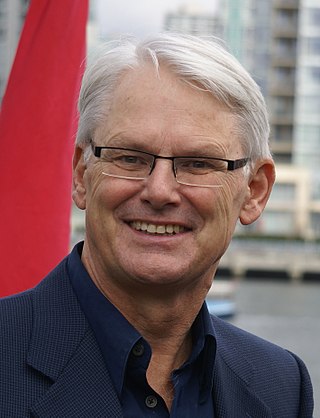
The 2005 British Columbia general election was held on May 17, 2005, to elect members of the Legislative Assembly (MLAs) of the Province of British Columbia (BC), Canada. The British Columbia Liberal Party formed the government of the province prior to this general election under the leadership of Premier Gordon Campbell. The main opposition was the British Columbia New Democratic Party, whose electoral representation was reduced to two MLAs in the previous provincial election in 2001.
Your Political Party of British Columbia, or simply Your Party, is a minor political party in British Columbia, Canada. The party is registered with Elections BC and has participated in the 2005, 2009, 2013, and 2017 general elections. The party advocates more transparency and accountability in government. It nominated one candidate in 2005, two in 2009 and 2013, and 10 in 2017. No Your Party candidate has been elected to office as of 2017. Its best result was a fourth-place finish with 442 votes (1.68%) in Port Moody-Westwood in 2005.
The Work Less Party was a political party in the Canadian province of British Columbia. The party was founded in 2003 by Conrad Schmidt and de-registered in May 2017. The primary aim of this party was to move to a 32-hour work week and its party slogan was "Work Less, Consume Less, Live More." The slogan describes the party's aim to encourage people to reduce their consumption, to be more environmentally and socially conscious, and to focus on real values. Instead of consuming, people are encouraged to spend time on family, friends, community engagement, art and creative endeavours, spiritual exploration, and athletic activities.

Elections BC is a non-partisan office of the British Columbia legislature responsible for conducting provincial and local elections, by-elections, petitions, referendums, plebiscites in the Canadian province of British Columbia. Its federal equivalent is Elections Canada.

Vancouver-Fraserview is a provincial electoral district for the Legislative Assembly of British Columbia, Canada.
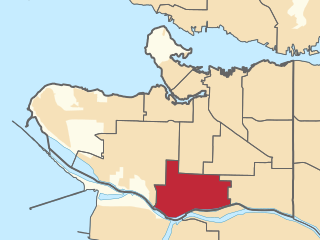
Vancouver-Langara is a provincial electoral district for the Legislative Assembly of British Columbia, Canada.
The British Columbia Patriot Party was a minor political party in British Columbia, Canada. The party's stated goal was "to empower citizens to govern themselves by converting the provincial government into a republic with an upper house made up of citizens selected at random and based on merit." The party was formed in 2001 by Andrew Hokhold, a dentist and inventor living in the Vernon / Armstrong area. Hokhold was the party's only candidate in the 2001 election, coming in last place in the Okanagan-Vernon riding. Two candidates, Hokhold and White Rock resident Tibor Tusnady, ran in the 2005 election, both coming in last place, in the Shuswap and Okanagan-Vernon riding, respectively.
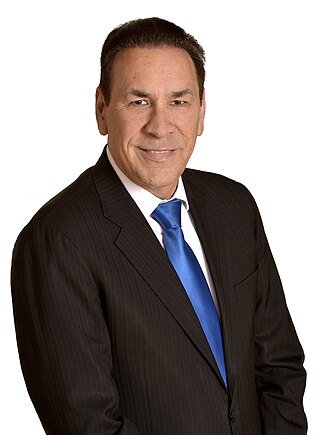
Jagrup Brar is a Canadian politician. He is a member of the Legislative Assembly (MLA) in British Columbia, representing the riding of Surrey-Panorama Ridge from 2004 to 2009, then Surrey-Fleetwood from 2009 to 2013 and since 2017. A member of the British Columbia New Democratic Party, he has served as the province's minister of State for Trade since 2022.
John Ince is a Canadian author, lawyer, entrepreneur and from 2005 to 2012 activist in the sex-positive movement.

The 2009 British Columbia general election was held on May 12, 2009, to elect members of the Legislative Assembly in the Canadian province of British Columbia. The British Columbia Liberal Party formed the government of the province prior to this general election under the leadership of Premier Gordon Campbell. The British Columbia New Democratic Party under the leadership of Carole James was the Official Opposition.
The Nation Alliance Party was a minor political party in British Columbia, Canada. While the party was registered with Elections BC as a provincial party, it also participated in the 2008 federal election, the 2008 municipal election, as well as the 2009 provincial election. The party sought to promote multiculturalism, advocate for rights of ethnic minorities and recent immigrants focusing on employment access, security, health care, education and overall rights and status. It was an advocacy party that sought to politically empower and enable those who do not speak English as a first language to participate in politics.

Spencer Chandra Herbert is a Canadian politician who serves in the Legislative Assembly of British Columbia in Canada. Representing the British Columbia New Democratic Party, he won an October 2008 by-election in the electoral district of Vancouver-Burrard. He was re-elected to the Legislature, this time in the newly created riding of Vancouver-West End, in the 2009, 2013, 2017, and 2020 general elections. He has served as deputy speaker of the Legislature since December 7, 2020.

Benjamin Richard Stewart is a Canadian politician, who has represented the riding of Kelowna West in the Legislative Assembly of British Columbia since 2018 as a member of BC United. He previously represented the riding of Westside-Kelowna from 2009 to 2013.

Mable Elmore is a Canadian politician that represents the Vancouver-Kensington electoral district in the Legislative Assembly of British Columbia. A member of the British Columbia New Democratic Party, she was first elected as a Member of the Legislative Assembly (MLA) in the 2009 provincial election. Currently the Parliamentary Secretary for Anti-Racism Initiatives, she previously served as the Parliamentary Secretary for Poverty Reduction (2017–2020) and Parliamentary Secretary for Seniors Services and Long Term Care (2020–2022).
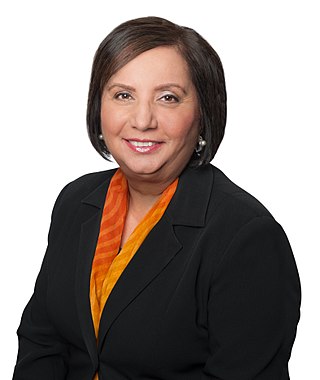
Jinny Jogindera Sims is an Indian-born Canadian politician, who was elected as a New Democratic Party Member of the Legislative Assembly of British Columbia in the 2017 provincial election in Surrey-Panorama. She previously was elected to the House of Commons of Canada in the 2011 election. She represented the electoral district of Newton—North Delta as a member of the New Democratic Party. Sims was also a candidate for Mayor of Surrey in the October 2022 civic elections. She placed fourth with 12.58% of the vote.

Andrew Wilkinson is an Australian-born Canadian politician. He is the former leader of the British Columbia Liberal Party, and served as the leader of British Columbia's Official Opposition. He was elected to the Legislative Assembly of British Columbia in the 2013 provincial election and re-elected in 2017 and 2020. He represented the electoral district of Vancouver-Quilchena.
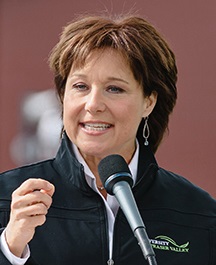
The 2017 British Columbia general election was held on May 9, 2017, to elect 87 members (MLAs) to the Legislative Assembly to serve in the 41st Parliament of the Canadian province of British Columbia. In the 40th Parliament prior to this general election, the British Columbia Liberal Party formed the government under the leadership of Christy Clark, while the British Columbia New Democratic Party (NDP), under the leadership of Adrian Dix and then John Horgan, formed the Official Opposition; the Green Party of British Columbia were also represented in the legislature with sole MLA and later leader Andrew Weaver.

A referendum on electoral reform took place by mail-in ballot between October 22 and December 7, 2018, in the Canadian province of British Columbia. 61.3 percent of voters supported maintaining the first-past-the-post voting system rather than switching to a proportional representation voting system, which was supported by 38.7 percent of voters. This was British Columbia's third referendum on electoral reform, following ones in 2005 and 2009.













